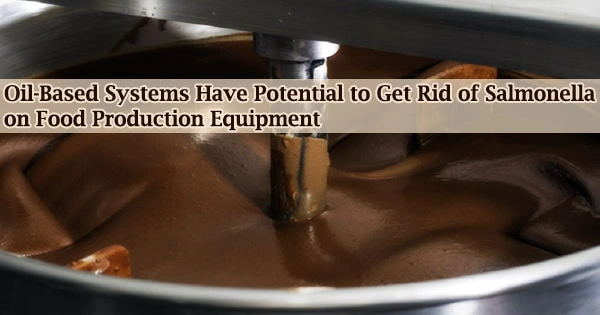Peanut butter and chocolate have been linked to recent outbreaks of Salmonella in food. Despite the fact that Salmonella cannot grow in either of these low-water foods, the cells do survive and develop increased heat resistance, which has aided in recent outbreaks.
According to recent research that was published in the journal Applied and Environmental Microbiology, dried Salmonella on stainless steel surfaces can be eliminated by oil formulations including food-grade organic acids.
“Cleaning and sanitation of manufacturing environments are critical for a safe food supply,” said lead author Lynne McLandsborough, Ph.D., a professor of food science at the University of Massachusetts Amherst.
However, because it encourages microbial development, water-based washing is infrequently utilized in the production of peanut butter. Additionally, peanut butter and water don’t mix, and cleaning up with water is difficult, as anyone who has baked peanut butter cookies can attest, added McLandsborough.
Instead, producers frequently use heated oil to remove leftover peanut butter from production lines, followed by overnight chilling and the use of flammable alcohol-based sanitizers.
To our knowledge, using oils as a carrier of organic acids is a novel approach to delivering antimicrobial compounds against food-borne pathogens.
Professor Lynne McLandsborough
Salmonella was dried on stainless steel surfaces in the investigation by McLandsborough and associates under controlled relative humidity. Then, they used several oils and organic acids to cover the dried bacteria, adjusting the acid type, concentration, contact duration, and treatment temperature to find formulations that were highly antibacterial.
By using peanut oil mixed with acetic acid at a concentration about half that of household vinegar and applying heat, “killing was much greater than expected, indicating a synergistic effect,” said McLandsborough.
“Our results show that acidified oils could be used as an effective means of sanitation in low-moisture food processing facilities, where water-based cleaning can be challenging.”
“To our knowledge, using oils as a carrier of organic acids is a novel approach to delivering antimicrobial compounds against food-borne pathogens,” said McLandsborough.
Thus, the study may result in the adaption of oil-based methods for industrial cleanings, such as for equipment used to prepare peanut butter and chocolate, said McLandsborough. “That would enable more frequent cleaning, boosting the safety of these products.”





